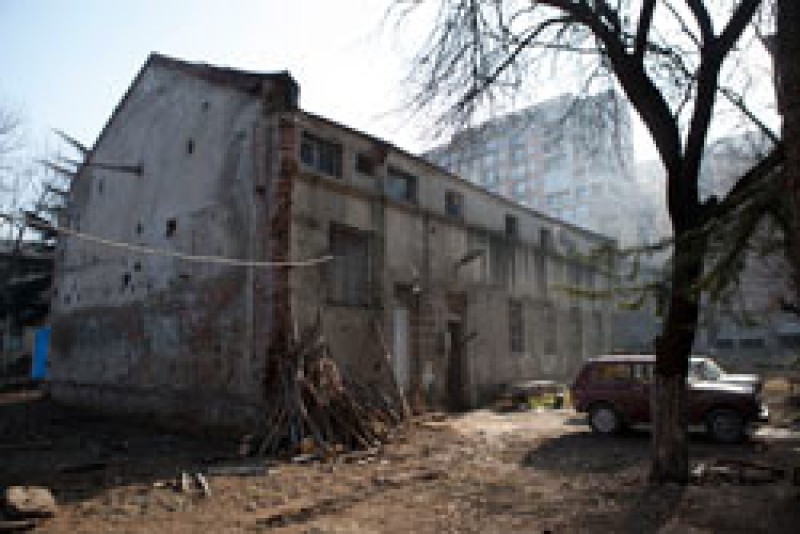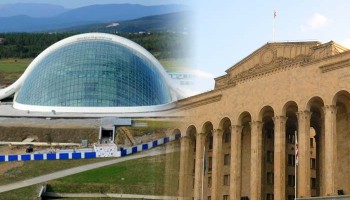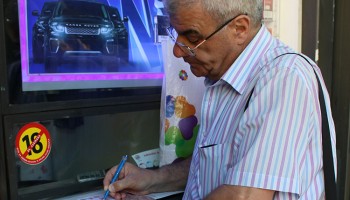An independent assessor says the land alone was worth nearly twice that.
The independent assessment by the Levan Samkharauli National Forensics Bureau, commissioned by the Organized Crime and Corruption Reporting Project (OCCRP) in August of 2013, said that the land would have been worth US$20.5 million in 2009—and that’s without counting the buildings.
Bargain prices are not unusual in privatization deals, but in most cases they are accompanied by contract language that orders the winning bidder to make major improvements to the land and property within a certain time span.
That was not the case with Aversi-Pharma, which the year before had given more than US$113,000 to then-President Mikheil Saakashvili’s ruling political party. The 2009 deal did not require the pharmaceutical company to make any improvements at all.
According to the Georgian constitution in effect at that time, the president had the right to issue orders to sell land and buildings owned by the government.
When Saakashvili gave such an order, the procedure was for Tbilisi City Council to list an assessed price for the value of the land and for an independent assessment to be made. The final auction starting price would then be set, considering both the City Council’s and the independent auditor’s assessments, according to a Ministry of Economics spokesman.
The 2009 independent assessment, by a company called Auditescort, valued the land and buildings at US$11.1 million.
Mindia Tabaghua, the chief auditor at Auditescort, did the assessment. “The suggested price from us does not mean that the government will sell at that price. They may either increase or decrease the price when selling the land,” Tabaghua said.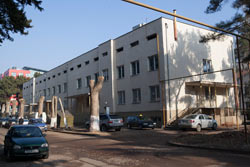 The AIDS center is in good shape, but staff is worried about the future. Photo by: George Gogua
The AIDS center is in good shape, but staff is worried about the future. Photo by: George Gogua
Magda Anikashvili, who in 2009 was deputy chair of the Committee on Health Care and Social Issues in Parliament, says land at medical complexes was never sold at market price. But she said that when other huge Soviet-era medical complexes were sold, tough auction conditions required the successful buyer to make major improvements to land and facilities.
While Aversi-Pharma did not have to make improvements, it was obligated to do certain things.
The auction conditions required the buyer to allow two key clinics on the site to keep operating for two years. The Infection Pathology, AIDS and Clinical Immunology Center and the Sepsis Clinic provide low-cost treatment to people with serious infections and life-threatening illnesses, such as HIV and hepatitis C, that are often stigmatized worldwide.
Last May, Aversi-Pharma notified the clinic directors that the time had come to leave the private property. But since the Ministry of Labor, Health and Social Affairs has not managed to relocate the two centers elsewhere in Tbilisi, they have been unable to move.
While the two sides remain in a standoff, clinic officials say patient care is suffering.
Running the Gauntlet
They say it can be difficult for their patients to find the courage to even seek treatment, as they must walk through a public gate staffed with guards to get into the compound. For some patients, the only way they will agree to seek treatment is if they can maintain anonymity.
For a time, the new owners threatened that anonymity.
Last July, Aversi-Pharma decided to restrict acceptance of patients to the AIDS and Infection clinic. Aversi sent a letter to the clinic administration that said: “Only those patients will be accepted whose names are e-mailed in advance to the administration.”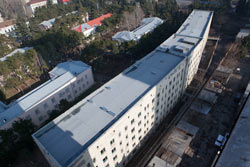 An aerial view of the Sepsis Center, a huge structure from Soviet days. Photo by: George Gogua
An aerial view of the Sepsis Center, a huge structure from Soviet days. Photo by: George Gogua
Center General Director Tengez Tsertsvadze did not agree to this. “The suggested rules did not become reality,” he said. “But I must state that the suggestion was not only theoretical, but was creeping into practice. The guards were standing at the gateway and saying to the visitors: 'from tomorrow, new rules will be enforced'.”
The guards still stand at the compound gate. They still stop every incoming car and ask where they are going. But there are no more questions about a person’s name or for what disease they have come to be treated, and the guards do not stop anyone from coming in.
But director Tsertsvadze thinks the guards still serve as a significant obstacle for patients. He says people with AIDS sometimes leave when they see any kind of behavior at the gate other than a welcome and a smile.
“Many of them will turn around and forget about treatment,” Tsertsvadze said. “It took us a lot of time and effort to persuade them that treatment is important. Many people who have acquired infections or viruses do not realize that they pose a danger to others as well. So it is important that we make them welcome at the door with a smile, and not create any kind of an obstacle for them.”
When Tsertsvadze refused to accept the restrictions, he said Aversi-Pharma sent him a signed and sealed letter and asked him to create acceptable rules. Tsertsvadze has not created a package of rules so far. But he says the rules will not be any different from those at any other clinic in Georgia or elsewhere.
“Let it be the same rules in my clinic area as it is in Aversi’s other clinics,” Tsertsvadze said. “If you go to an Aversi clinic, no one will stop you at the door and ask you where you are going.”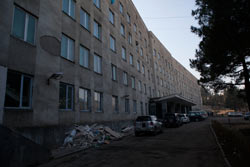 Work is ongoing at the Sepsis Center building. Photo by: George Gogua
Work is ongoing at the Sepsis Center building. Photo by: George Gogua
The Ministry of Labour, Health and Social Affairs is involved in the negotiations between the two government clinics and Aversi-Pharma. First deputy minister Dimitry Makhatadze said patients should be the top priority.
“We told Aversi-Pharma that they should take into consideration what is the most important. Patients and medical service should not be halted,” Makhatadze said. “Both the clinic management and the land owner company should realize that their decisions should not prevent medical service for patients. It is a pity that no large infrastructure project was finished so that both clinics could leave and move into new buildings.”
Aversi-Pharma management refused a face-to-face interview. In an email, the company wrote:
“We do not prevent the clinics from functioning. They can remain on our land until they can relocate to an alternative building (somewhere else). Everything will be agreed upon and negotiated with the Ministry of Labor, Health and Social Affairs of Georgia.”
There is no written agreement signed by Aversi-Pharma and the clinic management about how the clinics should operate until alternative space is found. Both parties say they are working on written regulations. But according to Tea Chaduneli, the AIDS and infection center lawyer, no such agreement has been signed so far.
Finding a New Home
The clinic has been beset by other problems. Because it is taking so long to find new homes for these treatment centers, international donor funding to help relocate the AIDS clinic has dried up. And a new home selected for the clinic is still occupied.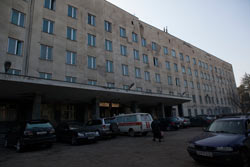 People still come and go at the Sepsis Center. Photo by: George Gogua
People still come and go at the Sepsis Center. Photo by: George Gogua
In 2011, the Ministry of Health allocated the Soviet-built Institute of Cardiology on Gudamakari Street in Tbilisi for use as a new home for the AIDS and Infection clinic. But the building was full of residents who have been living there illegally for many years. The clinic put its own guards at the building to keep more people from moving in.
Chaduneli says she wrote an official letter to the local police asking them to help relocate the residents, including at least five families of whom are internally displaced people (IDPs) who lost their homes either 20 years ago when Georgia lost control of the breakaway region of Abkhazia, or in 2008 after the war between Georgia and Russia.
“The police say they have long had a problem with the illegal residents and it is difficult to force them to leave the building. I do not know what will happen in this case,” Chaduneli said. “Eventually, we should leave our current building. But how can the construction begin if the citizens still occupy (the other building)?”
Murad Ablotia, who deals with homeless refugees for the Ministry of Internally Displaced Persons, said the refugees would be offered money for renting apartments as soon as the Ministry of Health takes care of the homeless people who currently occupy the building alongside the IDPs.
“There are only five refugee families in the building; the rest of them are regular citizens with no homes,” Ablotia said. “For those five families, we will offer a temporary fee to cover housing rents, for some time. Then they can be added to the list of all IDP people waiting to get new houses.”
The original schedule for reconstructing the new home for the AIDS center called for tenders to be awarded in September. The Global Fund to Fight AIDS, Tuberculosis and Malaria was planning to share costs with the Ministry of Health and Social Affairs on the US$6 million infrastructure project.
In a July interview, Akaki Lochoshvili, executive director for project implementation at Global Fund’s Tbilisi office, said both Georgian and foreign specialists had visited the 40-year-old building and said it was well worth rehabilitating. Lochoshvili estimated that it would take about 18 months to do the work.
But in October, Lochoshvili said Global Fund would not contribute to the rehabilitation. “It is no longer the Fund’s priority to take part in infrastructure and rehabilitation projects,” Lochoshvili said. “The Fund decided to invest more in AIDS prevention and treatment.”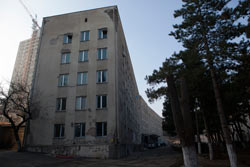 While the massive building is in use, it also needs renovations. Photo by: George Gogua
While the massive building is in use, it also needs renovations. Photo by: George Gogua
Elsewhere on the property, the huge five-story Sepsis Center building contains 6,000 square meters of space and has 650 beds (of which only 17 were occupied on a recent day).
Since the collapse of the Soviet Union, almost all such huge buildings operate at a loss. The Georgian government doesn’t want to keep it, and the center can’t sustain itself, in part because sepsis is also treated in smaller clinics in Tbilisi.
Sepsis Center director Omar Qutidze asked the National Agency for State Property Management to find an alternative building. The agency suggested the former maternity house located on Tevdore Mghvdeli Street. The plan was acceptable for Qutidze, who has been the Sepsis Center director since it opened in 1987. But then the Ministry of Health said it had no funds to rehabilitate the building.
So the Ministry of Economics decided to schedule an auction in October 2013 in hopes of finding a private investor to operate the clinic. But nobody registered in advance to submit a bid, so the auction was cancelled.
Aversi-Pharma is not saying whether it is interested in acquiring the Sepsis Center. “We will think about it when privatization conditions are announced,” Aversi-Pharma wrote.
So what is Aversi-Pharma eventually going to do with the property?
“Medical activities,” was the short e-mail answer from the company.
